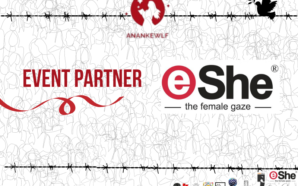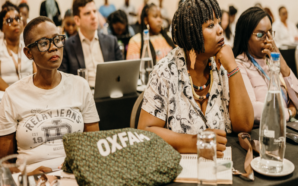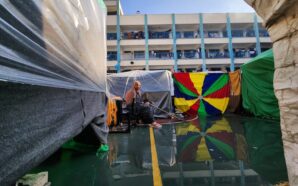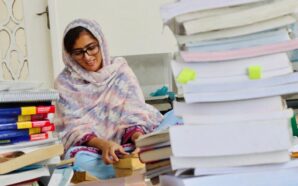Aïcha Ech Channa is the Founder and President of Solidarité Féminine, providing services in Casablanca, Morocco, to help unmarried women with children gain the knowledge and skills necessary to ensure their own livelihoods. During the 1980s, Ech Channa worked with the Moroccan Ministry of Social Affairs, where she was confronted by the ordeals these women and children faced on a daily basis. A Muslim, Ech Channa says she gains inspiration from a sense of justice rooted in the value system of all religions. She explains that single mothers have been marginalized and stigmatized for too long in Moroccan society, although she notes the situation is improving. Solidarité Féminine officially was recognized in 2002 by the government as a charitable organization and has received financial support from Moroccan King Mohammed VI. His wife, Princess Salma, attended the opening of the association’s hammam (fitness center and spa) in 2004.
 Tell us about Solidarite Feminine. What is ASF? What are the major objectives of the association?
Tell us about Solidarite Feminine. What is ASF? What are the major objectives of the association?
The Association Solidarité Feminine (ASF) was initially founded in 1985 with the objective to provide shelter and other forms of social assistance to unmarried mothers in Morocco. ASF has a double objective, that is, both legal and socio-economic.
Legally, it strives for the recognition of abandoned children by the biological father in official state documents so that such children do not hold the status of illegitimate (on their ID) throughout their life. Additionally, Solidarite Feminine also works for the social reintegration of stigmatized mothers in the period following the ‘trauma’ which is usually characterized by the rejection of the young mother by the biological father as well as her own family. At ASF, the hosted mothers have the opportunity to attend literacy classes and workshops where they acquire the practical skills needed to secure a regular and decent income.
Now, nearly 25 years after its official inception, Solidarité Féminine employs women at two restaurants, a bakery, four small shops and a Moroccan bath, and provides them with healthcare, childcare, and job skills.
How did the idea to found an association for single mothers come to you in the first place and why?
Single mothers with children born out of wedlock are the ultimate ‘taboo individuals’ and are often rejected and marginalized within their communities. Most of these women come to us dishonored by their families, thrown out into the streets and left with no resources. More unfortunately, pregnancy is quite often the result of abuse or rape, while young mothers are the only ones to be blamed for what is seen as a crime against the entire society. Moreover, the children born to unmarried mothers suffer as well. Many abandoned babies have died in orphanages or grew up scarred by their status. Without a ‘proper’ family name and without papers, they are condemned to be called ‘illegitmate’ for life. I slowly came to understand the depth of the stigma and bias that young women experience when they are pregnant out of wedlock, and if they try to raise their babies. They are likened to prostitutes, even if they are young and vulnerable, and even if their pregnancy is the result of rape. Therefore, as a social worker in Casablanca who has witnessed sexual violence and the terrible plight of young unwed mothers and the miserable fate of their innocent children, I was truly motivated to found ASF back in the 80’s.
Was there any major event in your life that ultimately determined you to found ASF? Any anecdotes?
I often tell the story of a moment and an image that are still vivid in my mind. They come to me when I cannot sleep, which is often. Once in the 1970s, during a very cold winter, I passed by a hospital where there was a nursery full of abandoned babies ready to be transferred to an orphanage in Casablanca. These babies were already blue from the cold. I felt some of them could be dying. When I asked why, I learned that they were just dropped off and the mothers had nothing to leave with them. The hospital did not have the resources to fill the gap either. I also remember seeing another place in a poor area where single mothers left their babies, where babies were stacked in vegetable boxes, without any care. I knew that we could do far better. My journey led me along the way to work often with a French nun, Marie-Jean Tinturier, who was also a social worker. We met many young women and realized that they often did not want to abandon their babies. We also realized that, however hard the lives ahead, the babies needed their mothers and that there was no substitute for a mother’s love.
 What were the major challenges faced by the association since its inception?
What were the major challenges faced by the association since its inception?
In 1985, we decided to start a program, and we did not call it an association at first. In fact, if we had submitted a project proposal, we knew it would have been rejected by everyone – in a society that fiercely condemns extramarital relationships and puts the sole responsibility of morality on women. So we began in a basement, in a small corner that a women’s organization kindly provided us somewhere where we could work. We conducted no studies because we had no resources. Everyone was a volunteer, and there were only three dedicated people at the time. I myself continued to work as a government social worker as I could not afford losing my job, and soon, I quickly found myself overloaded with work. In fact I think that if we had any notion of the obstacles we would face, we would never have had the courage to begin with. We began with a daycare center so that babies would be cared for during the daytime while their mothers had a chance to learn some skills that would allow them to work. We wanted to have a decent place. We began small and grew over the years.
In our defense of unwed mothers’ rights to social recognition, we were also opposed with the strong wrath and resistance. I was often accused of promoting promiscuity and prostitution through my support of single mothers’ right to a decent life; I received death threats on many occasions as well.
What has been the local and international recognition of ASF so far? Are you happy with it?
In 2009, during Solidarité Féminine‘s 24th year, I was awarded the world’s largest faith-based prize for entrepreneurship, the Opus Prize. The prize provided the organization with USD 1 million of financial support. The Moroccan-American board based in Washington DC held an event at that time and we were all very happy. The Opus Prize is awarded to activists all over the world who take up the challenge of solving the most persistent social problems. It aims at encouraging outstanding entrepreneurial enterprises that demonstrate an abiding faith to combat intractable global issues like poverty, illiteracy, hunger, disease, and injustice by empowering the less privileged. I also received significant financial support from Moroccan King Mohammed VI and his wife, Princess Salma, who personally attended the opening of the association’s fitness center and spa in 2004 and which is one of our biggest source of pride.
What do you think are the major challenges Arab women face today?
The real issue is the mentality of some people whose purist, fundamentalist traditions, and culture, shape the society’s attitudes towards women as well as the relations between men and women, and the social expectations from women. These attitudes lie behind the social hierarchy which makes the lives of women so difficult. There is a clear social ladder. At the top of that hierarchy is a mother with sons, then a mother, then a widow, then a divorced woman, then a single woman. At the very bottom is the single mother. There is an urgent need today to tackle this kind of misguided perception and attitude through education and raising awareness in order to change the status quo in the favor of women, children and equality for a better future.
About the Writer:
 Maha Tazi is a graduate in International Relations and Middle Eastern Politics from the University of Wollongong in Dubai (UOWD). She is currently working as a Project Consultant in Public Relations and Corporate Communications at APCO Worldwide and teaching part-time as an adjunct instructor in Philosophy at UOWD. Maha has a special interest in world affairs and gender issues: She took a Women Studies course for one year at Sciences Po Paris and worked with several civil society organizations which struggle for the advancement of women’s rights including Association Solidarite Feminine (ASF) in Morocco.
Maha Tazi is a graduate in International Relations and Middle Eastern Politics from the University of Wollongong in Dubai (UOWD). She is currently working as a Project Consultant in Public Relations and Corporate Communications at APCO Worldwide and teaching part-time as an adjunct instructor in Philosophy at UOWD. Maha has a special interest in world affairs and gender issues: She took a Women Studies course for one year at Sciences Po Paris and worked with several civil society organizations which struggle for the advancement of women’s rights including Association Solidarite Feminine (ASF) in Morocco.










